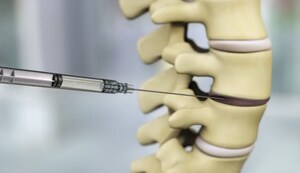SALT LAKE CITY, Aug. 7, 2019 /PRNewswire/ -- DiscGenics, Inc., a clinical stage biotechnology company focused on developing regenerative cell-based therapies that alleviate pain and restore function in patients with degenerative diseases of the spine, today announced the first patients have been treated in its Japanese safety study, a clinical trial of IDCT for mild to moderate degenerative disc disease (DDD). The treatments took place at Tokai University School of Medicine in Kanagawa, led by Dr. Daisuke Sakai, Associate Professor at the Department of Orthopaedic Surgery and the study's principal investigator.
IDCT is a homologous, allogeneic, injectable cell therapy that utilizes biomedically engineered progenitor cells, known as Discogenic Cells, that have been derived from intervertebral disc tissue to offer a non-surgical, potentially regenerative solution for the treatment of mild to moderate DDD.
This prospective, randomized, double-blinded, sham-controlled study is designed to evaluate the safety and preliminary efficacy of IDCT at two dosage levels in subjects with single-level, symptomatic lumbar DDD, a major cause of chronic low back pain.
"I am excited to be participating in the clinical evaluation of IDCT as a potential cell therapy to treat degenerative disc disease," said Dr. Sakai. "I am encouraged by my preclinical observations of IDCT's human Discogenic Cells in a canine disc degeneration model that demonstrated the ability to stop disc height degeneration while improving the structure of the intervertebral disc. If we can achieve similar results in human subjects, the result could be reduced pain and disability associated with DDD."
Initiation of this trial was supported by the Japanese Pharmaceuticals and Medical Devices Agency (PMDA) approval of a Clinical Trial Notification (CTN) application for IDCT, announced in the fourth quarter of 2018.
The trial will take place in six centers across Japan and will enroll 38 subjects. Those who meet all eligibility criteria will be randomized to one of three treatment cohorts: low dose IDCT (n=15), high dose IDCT (n=15) and sham (n=8).
Each subject will receive a single intradiscal injection of his or her assigned treatment into the target symptomatic lumbar intervertebral disc. Following treatment, subjects will be observed and evaluated for a period of six months, with a six-month extension period.
For more information, please visit https://clinicaltrials.gov/ct2/show/NCT03955315.
"Commencing clinical evaluation of our first product candidate in Japan is a significant milestone for DiscGenics as we continue to advance IDCT as a potentially revolutionary treatment for DDD," said Flagg Flanagan, Chief Executive Officer and Chairman of the Board of Directors for DiscGenics. "With IDCT, we have an opportunity to serve Japan's aging population by providing a novel, interventional therapy for DDD, one of the most common causes of chronic low back pain and a well-known unmet medical need."
DDD is a painful, chronic and progressive disease that is characterized by inflammation and breakdown of extracellular matrix within the intervertebral disc. The condition is estimated to affect more than one million people, including 200,000 patients needing surgical intervention every year in Japan. Current treatment options for DDD are limited to physical rehabilitation programs and pain management, in the earlier stages. In the more advanced stages, oftentimes a patient's only option is surgical intervention to remove the painful disc(s), fuse two or more vertebral bones together and/or replace bone or tissue altogether. However, back surgeries often have limited success and may result in subsequent adjacent level degeneration.
"DiscGenics is one of the first non-Japanese regenerative medicine biotechnology companies to get approval of the PMDA to conduct a Japanese clinical trial," said Colin Novick, Managing Director of CJ Partners, Inc. and an in-country consultant to DiscGenics. "Additionally, they are the first to assign an In-Country Clinical Caretaker (ICCC), allowing them to be the first company to act as their own trial sponsor. This is an important precedent as it demonstrates a commitment on behalf of Japanese regulators to advancing regenerative medicines and an openness to accepting smaller, non-Japanese sponsors of domestic clinical trials so long as they can show strong safety and adhere to the available Japanese guidelines for cell and gene therapies. Personally, I am very happy that DiscGenics is keeping on track with their clinical strategy in Japan and showing the world that a parallel USA/Japan track is a viable and effective way forward for innovative cell and gene therapy companies."
DiscGenics is also conducting an ongoing phase I/II prospective, randomized, double-blinded, vehicle- and placebo-controlled, multicenter clinical trial of IDCT in the U.S. Through this study, IDCT is being evaluated under an investigational new drug (IND) allowance by the U.S. Food and Drug Administration (FDA) and will be regulated as a drug-biologic through a therapeutics biologics application (BLA). Importantly, the study has shown safety in the first cohort of patients and is continuing enrollment.
About DiscGenics
DiscGenics is a privately held, clinical stage biotechnology company focused on developing regenerative cell-based therapies that alleviate pain and restore function in patients with degenerative diseases of the spine. As the only company in the world to develop an allogeneic cell therapy derived from intervertebral disc cells to treat diseases of the disc, DiscGenics believes it has a unique opportunity to harness the restorative potential of the human body to heal millions of patients suffering from the debilitating effects of back pain. DiscGenics' first product candidate, IDCT, is a homologous, allogeneic, injectable cell therapy that utilizes biomedically engineered progenitor cells derived from intervertebral disc tissue, known as Discogenic Cells, to offer a non-surgical, potentially regenerative solution for the treatment of patients with mild to moderate degenerative disc disease. For more, visit www.discgenics.com.
SOURCE DiscGenics, Inc.

Related Links
WANT YOUR COMPANY'S NEWS FEATURED ON PRNEWSWIRE.COM?
Newsrooms &
Influencers
Digital Media
Outlets
Journalists
Opted In






Share this article